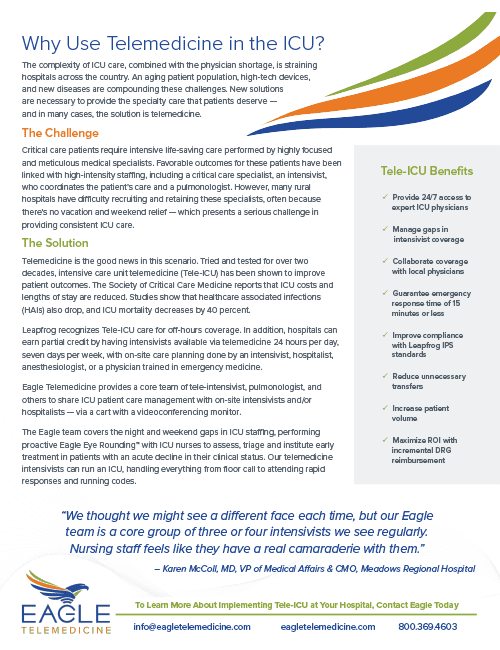Over the past several years, hospital revenue has fallen while facilities have also been pushed to provide higher quality, lower cost care. In many states, hospitals joined regional health networks to offer more coordinated care using shared resources. Smaller hospitals, often in rural areas, struggled to serve their communities without that support system, losing physician staff and relying on tertiary centers — possibly 100 miles away, or more — to handle patients requiring critical care or specialty surgeries.
It’s become clear that, in today’s healthcare environment, a hospital must offer a range of services in order to survive. A diversified portfolio of service is critical, especially those that are most profitable. Let’s examine the most profitable services a hospital can offer:
- Inpatient Surgery: Approximately 30% of hospitalizations include a surgical procedure.
- Gastroenterology: This specialty generates more net revenue for hospitals than general surgeons, internal medicine physicians and oncologists.
- Wound Care: Growing prevalence of diabetic ulcers and sports-related injuries indicate the need for wound care will expand by 4.5% annually.
- Cardiology: Chronic care management of cardiology patients results in new revenue as most of these patients are Medicare beneficiaries and have two or more chronic conditions.
- Hospitalist Medicine: Inpatient care for the above specialties are often supported by regular rounding by Hospitalists — care that is necessary to maintain patient care, hospital metrics and fund hospital operations that support the community.
Quantify Your ROI
How can a telemedicine program deliver additional revenue and enhance your facilities ROI? Financial benefits of Eagle’s telemedicine programs include:
- Reducing transfers
- Lower turnover and less physician burnout
- Eliminating locum support costs
- Cost Efficiencies through economies of scale
- Patient Satisfaction
- Reduced length of stay
Opportunities for Hospital Revenue Growth
The amount of revenue physicians generate for hospitals is considerably more than their annual salaries. A 2018 review of hospitals found that the physician specialties that generate the highest average annual net revenue for hospitals include:
- Cardiology
- Hospitalist Medicine
- Neurology
- Pulmonology
- Surgery
Given the aging population, and chronic conditions rampant in this age group, hospitals are finding that specific opportunities for revenue growth lay ahead:
Stroke Care
The FAST (Furthering Access to Stroke Telemedicine) Act expands telemedicine for stroke by requiring Medicare to reimburse for TeleStroke services regardless of where a patient receives treatment.
Medicare now covers TeleStroke at urban and suburban hospitals, instead of only to rural hospitals, allowing TeleStroke services as close to the patient as possible — even if the hospital is two miles away, resulting in faster decision-making, faster treatment, and better outcomes.
TeleStroke services are covered 80-85% by Medicare, which provides hospitals with the opportunity to implement telemedicine and achieve a net positive Return On Investment (ROI). TeleStroke also keeps patients in their local community, instead of requiring transfer to another facility in a larger metropolitan area.
ICU Telemedicine Provides Expert Care
 With more than 5 million patients treated in ICUs each year and the increasing shortage of qualified ICU intensivists, our telemedicine program offers help to hospitals. Eagle Telemedicine’s offsite ICU intensivists:
With more than 5 million patients treated in ICUs each year and the increasing shortage of qualified ICU intensivists, our telemedicine program offers help to hospitals. Eagle Telemedicine’s offsite ICU intensivists:
- Reduce unnecessary transfers
- Increase patient volume
- Maximize ROI with incremental DRG reimbursement
Cardiac Care
In smaller hospitals, cardiac issues are often the number one reason for patient transfer. Patient transfers reduce inpatient revenue, which is critical to maintaining the financial viability of rural and Critical Access Hospitals (CAH). However, many of these patients only need a telemedicine cardiology consultation to determine whether local treatment is possible or the patient requires services from a larger facility.
Telemedicine cardiology application keeps patients who don’t require invasive cardiology from being transferred. TeleCardiologist can also provide valuable consultative assistance to hospitalists and inpatient providers in their management of patients with more challenging cardiac issues. TeleCardiology services are 60-75% Medicare-covered, which adds to the inpatient revenue and prevents patients from the expense and hassle of transfer.
Wound Care Center
Tele-ID specialists provide insight and consultation that is often necessary for effective healing. While the number of Infectious Disease (ID) specialists continues to decline and consolidate in major metropolitan areas, the need for ID specialists in hospitals continues to rise.
Eagle’s Tele-ID services allow hospitals to provide in-house specialty treatment for patients instead of transferring them to another facility. Hospitals that implement an ID program can realize quality of care enhancements, reduced length of stay and better antibiotic stewardship.
 TelePulmonology
TelePulmonology
TelePulmonology virtually links pulmonologists with patients. Pulmonary disorders include Chronic Obstructive Pulmonary Disease (COPD), asthma and pneumonia, which traditionally require multiple visits for care and follow-up. The prevention of COPD and pneumonia readmissions are also critical to avoid hospital readmissions.
The Hospital Readmissions Reduction Program (HRRP) penalizes hospitals by withholding up to 3% of regular reimbursements if they have a higher than expected number of readmissions within 30 days of discharge for six specific conditions, including COPD and pneumonia.
TeleNeurology
Hospitals may have an on-site neurologist (or neurologists) available, but not 24/7. Eagle’s TeleNeurology “Virtual Partnerships” present a solution to support staff — extending coverage for patients suffering from a Transient Ischemic Attack (TIA), breakthrough seizure, Parkinson’s disease and other neurological conditions. Simply determine when your on-site neurologist(s) will be unavailable, and telemedicine providers are scheduled to “beam in” and handle all consults and follow ups.
Emergency Medical Services
Avoiding patient transfers often requires on-demand access to specialists from a number of specialties — cardiology, neurology, psychiatry and others. Most rural hospitals do not have the demand or financial ability to support 24/7 coverage across a wide range of specialties.
Telemedicine helps small and mid-sized facilities access these specialists only when needed. On-demand consultations allow hospitals to offer services without incurring significant recruiting, retention and salary costs. Telemedicine consultations in the Emergency Department (ED) with a specialist are usually billable and prevent patient transfers.
What Does your Community Need?
Community Needs Assessments include a “listen-first approach” to improving community care, and these assessments are growing in popularity. They offer a thoughtful, systematic way of identifying and confirming the needs of the people you serve.
A community health needs assessment serves as a great starting point to advocate for improvement. The assessment identifies factors that affect the community’s health and the available, or needed, resources to help resolve those issues. Focus groups, public meetings, interviews, surveys and questionnaires provide data for the assessment. Demographic data, vital statistics, hospital records, as well as morbidity and mortality reports, also provide valuable information.
Mix of Services is Critical
No one service line typically keeps a hospital afloat. Community care and hospital stability requires a mixed portfolio of services. In many cases, hospitals introduce a single service, like neurology or pulmonology, and add other services incrementally.
The main message is this: keeping it local is cost-effective and beneficial to the patient. Providing care close to home reduces the patient’s stress level and healthcare costs.
That’s the beauty of telemedicine, bringing excellent healthcare to local hospitals so patients receives care when and where it is needed. And, that’s where Eagle Telemedicine has excelled for the past 15 years.
Regardless of whether your hospital or health system is experiencing issues with staffing gaps or specialty coverage, Eagle Telemedicine has the solution. Our deep bench of telemedicine providers helps you:
- Increase revenues by avoiding unnecessary transfers
- Provide specialized care on demand
- Support rounding and staff on nights, weekends and holidays
- Accelerate response times for emergencies
Spread your Message with Eagle’s Help
Marketing your hospital’s services will open the lines of communication to your patient audience — building trust and sparking interest in your new telemedicine services. Hospital marketing will allow you to increase your patient connections and nurture these relationships to form long-term community support.
A good marketing plan works to draw patients to your doors, and is always a cost-effective effort. Many hospitals don’t have a budget for advertising.
Eagle Telemedicine’s marketing support offers a wide range of services, including patient education materials. Our marketing team supports your program with:
- Consultation to identify your marketing needs
- Collateral development
- Press and media support
These suggestions will align with your community’s demographics and the services offered.
Let’s Talk About Telemedicine
Throughout the COVID crisis, telemedicine is positioned to reduce health delivery problems, including provider shortages. Simultaneously, Eagle continues to promote payment and service delivery models to increase consumer and payer value using telemedicine.
Hospital patients deserve to have telemedicine as a choice, as these services are proven to enhance outcomes, convenience and patient and staff satisfaction.
What Does your Community Need?
Community Needs Assessments include a “listen-first approach” to improving community care, and these assessments are growing in popularity. They offer a thoughtful, systematic way of identifying and confirming the needs of the people you serve.
A community health needs assessment serves as a great starting point to advocate for improvement. The assessment identifies factors that affect the community’s health and the available, or needed, resources to help resolve those issues. Focus groups, public meetings, interviews, surveys and questionnaires provide data for the assessment. Demographic data, vital statistics, hospital records, as well as morbidity and mortality reports, also provide valuable information.
Mix of Services is Critical
No one service line typically keeps a hospital afloat. Community care and hospital stability requires a mixed portfolio of services. In many cases, hospitals introduce a single service, like neurology or pulmonology, and add other services incrementally.
The main message is this: keeping it local is cost-effective and beneficial to the patient. Providing care close to home reduces the patient’s stress level and healthcare costs.
That’s the beauty of telemedicine, bringing excellent healthcare to local hospitals so patients receives care when and where it is needed. And, that’s where Eagle Telemedicine has excelled for the past 15 years.
Regardless of whether your hospital or health system is experiencing issues with staffing gaps or specialty coverage, Eagle Telemedicine has the solution. Our deep bench of telemedicine providers helps you:
- Increase revenues by avoiding unnecessary transfers
- Provide specialized care on demand
- Support rounding and staff on nights, weekends and holidays
- Accelerate response times for emergencies
Spread your Message with Eagle’s Help
Marketing your hospital’s services will open the lines of communication to your patient audience — building trust and sparking interest in your new telemedicine services. Hospital marketing will allow you to increase your patient connections and nurture these relationships to form long-term community support.
A good marketing plan works to draw patients to your doors, and is always a cost-effective effort. Many hospitals don’t have a budget for advertising.
Eagle Telemedicine’s marketing support offers a wide range of services, including patient education materials. Our marketing team supports your program with:
- Consultation to identify your marketing needs
- Collateral development
- Press and media support
These suggestions will align with your community’s demographics and the services offered.
Let’s Talk About Telemedicine
Throughout the COVID crisis, telemedicine is positioned to reduce health delivery problems, including provider shortages. Simultaneously, Eagle continues to promote payment and service delivery models to increase consumer and payer value using telemedicine.
Hospital patients deserve to have telemedicine as a choice, as these services are proven to enhance outcomes, convenience and patient and staff satisfaction.






